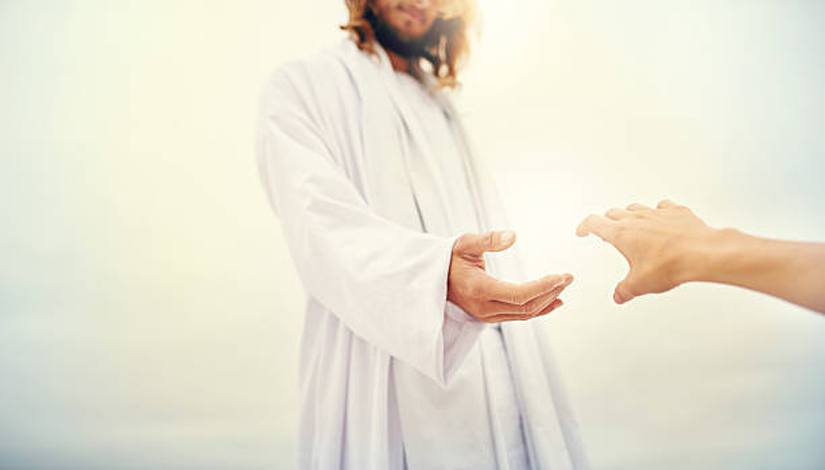A homily for Easter Sunday of the Resurrection of the Lord, April 12, 2020
Acts 10:34a, 37-43, Col 3:1-4, Jn 20:1-9
There’s a viral video making the rounds, a rather simple one of a gentleman mowing the lawn. At first glance, it’s nothing out of the ordinary: a retiree going back and forth over the grass, making nice straight passes of trimmed fescue and rye. Another Pleasant Valley Sunday, to borrow a phrase.
 But this is a Good News video, because the man, a former paratrooper, is doing yard work for a neighboring family while their dad is deployed overseas with the military. The lawn-cutter promised he’d take care of the family’s property while the trooper was away, because that’s what comrades do.
But this is a Good News video, because the man, a former paratrooper, is doing yard work for a neighboring family while their dad is deployed overseas with the military. The lawn-cutter promised he’d take care of the family’s property while the trooper was away, because that’s what comrades do.
In this little video, one person is keeping a promise.
Promises made, promises kept.
Which is the story of Easter.
We’re familiar with the theological underpinnings of Christ’s Resurrection, and its mind-blowing significance. How it — how He — changed the world for the better by accepting an unjust death as a sign of ultimate love for his friends and for everyone, and then rising from the dead, as no one had done before and no one has done since, to conquer the scourge of death that we believe came into the world when Adam and Eve sinned.
Jesus did it out of love, but he also did it out of obligation, to fulfill a promise the Creator made to humanity at the beginning of our relationship with God.
In fact, Jesus made this ultimate sacrifice to keep myriad promises, because God’s covenant with his people is chock-full of them.
Promises made, promises kept.
The beautiful — extensive — Liturgy of the Word at our Easter Vigil is the story, and the history, of God’s promises.
The promise to the earliest people that, at the proper time, their sins would be forgiven. And forgiven. And forgiven.
The promise to Abraham that his descendants would be as countless as the stars in the sky or the sands on the shore.
The promise to Moses that he would lead his people to, quite simply, the Promised Land.
The promise to the Chosen People that a savior, a Messiah, would be born of the house of David.
In the early days of God’s relationship with his people, the promises were covenantal; that is, they were as much of a contract as they were one person’s vows. The Israelites didn’t know I Am that well in the early days, so God wanted a few things in return before fulfilling the promises.
God knew of their stubbornness; he wanted them to know of his constancy and consistency.
And so, God had a straightforward list of please-dos to please me:
Obedience to those 10 little rules carved in stone, especially the one about strange gods.
Faith, belief and trust, usually manifested by obedience in a specific situation: Don’t look back as Sodom and Gomorrah burn. Follow the pillar of smoke. Wade into the sea. Keep kosher.
I’m keeping my promises, says God; can you say the same?
Then came Jesus of Nazareth, King of the Jews, the fulfillment of all promises and the herald of a more mature relationship with our Triune God.
Jesus preached — preaches — the fuller use of a well-formed conscience and a directing of human curiosity to things of the spirit. Jesus calls God his father and, through The Lord’s Prayer, urges us all to do the same.
Though he was the fulfillment of Old Testament — Old Covenant — promises, Jesus made a few himself, to augment the continuing promises of his father.
Wherever two or more are gathered in my name, I am there.
I will send my Spirit, the paraclete, the advocate, to guide you.
I go before you to make a home for you in my father’s house.
I will return for you.
This is my body. This is my blood of the new and everlasting covenant.
 This New Testament of Jesus, indeed, is based on the notion of a more mature relationship with God, and we are challenged by its nature, its complexity. Challenged, but not impossibly so.
This New Testament of Jesus, indeed, is based on the notion of a more mature relationship with God, and we are challenged by its nature, its complexity. Challenged, but not impossibly so.
And like his father, Jesus has an ask. Not challenging or complex, but simple, beautiful, and achievable: Love God. Love your neighbor as yourself.
Pay my love forward.
Jesus Christ is risen today. Alleluia! We sing it anew. Our triumphant holy day — Alleluia!
Christ is risen. Truly He is risen. Christos anesti! Alethos anesti!
And He is with us always.
But we are his hands and arms in the world now. Our eyes and ears are his, seeing the least among us, hearing their pleas for assistance.
Our coronavirus crisis has laid bare — as if that were really necessary — the wretched, festering wounds of inequality in our world, our nation, our towns. People of color, anyone who is poor or marginalized, are getting sick and dying at a far greater rate than better-off people who have easy access to health care, who can stay six feet apart in their homes and neighborhoods, and who can work from home instead of having to mop floors, wipe down every imaginable surface and stack boxes without protective equipment.
That doesn’t seem in sync with Love Your Neighbor as Yourself.
Jesus stretched out his arms on the cross and, in doing so, embraced the world. He rose, in a perfected form yet with his wounds still visible — thank you, Didymus — to remind us how far He was willing to go as a sign of his love.
Now, as Christ’s living body, it’s our turn to embrace the world, and perhaps suffer a wound or two in doing so.
And know in our hearts: Promises made, promises kept.
